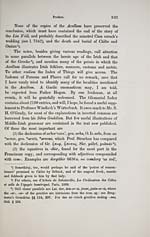Matheson Collection > Irische Texte
(16)
Download files
Complete book:
Individual page:
Thumbnail gallery: Grid view | List view

XII Preface.
the last two are in an ugly modern handwriting. The rest
of the codex is in a good fifteenth-centuiy script*). It ends with
the words: tainic remhe arsin go dorws in tsidha 7 dorinneííh
lamhach mas fi'or, et cetera^), which corresponds with 1. 7658.
After the words corresponding with 1. 6238 a leaf has been
lost, and with it the matter contained in 11. 6220 — 6564. The
arrangement of the stories in the Franciscan ms. differs some-
what from that of the other copies (see notes on 11. 224, 1450,
1479, 3725); and so many minor variations and additions are
mentioned in the notes that it may well be regarded as a second
recension. As hterature, the Franciscan Acallam is inferior to
the older versions, the scribe or redactor indulging overmuch in
those strings of alUterating adjectives which debase the later
compositions in Gaehc prose^). In none of the copies, however, will
be found the 'mystical rant and unashamed incoherence' which
characterise the work of some of the so-called Celtic revivahsts. The
tales, in fact,are generally told with sobriety and directness: they evince
a genuine feeling for natural beauty ^), a passion for music, a moral
purity singular in a mediaeval collection of stories, a noble love for
manliness and honour ^). Some of them seem to me admirable for
their unstudied pathos — see, for instance, the tale of Gael the Hai'dy
and Créde, pp. 22 — 25, and the account of the deaths ofFithir and
Dárine, pp. 117, 118. Sadder even than these is the non-fulfilment
of the prophecy in 11. 301, 302, that the tales of the Fiann
will be a pastime to the companies and nobles of the latter
time. In Ireland, at least, there are now few companies and no
nobles that are able to read them.
*) The scribe's name appears in p. 13, Misi concobar 0. d., and p. 21,
Misi concobhar ó dhubhdha.
*) The modern scribe adds the following note: ni bhfuil ann nios mo
re sccriobadh don cor so. 7 da mbeih dodhéanmais ar ndiothcell fair.
*) See 0' Donovan's remarks, The Battle of Bun na ngédh, p. IX.
*) See, for instance, the poem on Arran, 11. 340—351.
•*) 'What maintained you so in your life?' says the Christian Patrick.
And Cáilte, still a heathen, answers: 'Righteousness in our hearts, and
strength in our arms, and fulfilment in our tongues', 11. 118—120.
the last two are in an ugly modern handwriting. The rest
of the codex is in a good fifteenth-centuiy script*). It ends with
the words: tainic remhe arsin go dorws in tsidha 7 dorinneííh
lamhach mas fi'or, et cetera^), which corresponds with 1. 7658.
After the words corresponding with 1. 6238 a leaf has been
lost, and with it the matter contained in 11. 6220 — 6564. The
arrangement of the stories in the Franciscan ms. differs some-
what from that of the other copies (see notes on 11. 224, 1450,
1479, 3725); and so many minor variations and additions are
mentioned in the notes that it may well be regarded as a second
recension. As hterature, the Franciscan Acallam is inferior to
the older versions, the scribe or redactor indulging overmuch in
those strings of alUterating adjectives which debase the later
compositions in Gaehc prose^). In none of the copies, however, will
be found the 'mystical rant and unashamed incoherence' which
characterise the work of some of the so-called Celtic revivahsts. The
tales, in fact,are generally told with sobriety and directness: they evince
a genuine feeling for natural beauty ^), a passion for music, a moral
purity singular in a mediaeval collection of stories, a noble love for
manliness and honour ^). Some of them seem to me admirable for
their unstudied pathos — see, for instance, the tale of Gael the Hai'dy
and Créde, pp. 22 — 25, and the account of the deaths ofFithir and
Dárine, pp. 117, 118. Sadder even than these is the non-fulfilment
of the prophecy in 11. 301, 302, that the tales of the Fiann
will be a pastime to the companies and nobles of the latter
time. In Ireland, at least, there are now few companies and no
nobles that are able to read them.
*) The scribe's name appears in p. 13, Misi concobar 0. d., and p. 21,
Misi concobhar ó dhubhdha.
*) The modern scribe adds the following note: ni bhfuil ann nios mo
re sccriobadh don cor so. 7 da mbeih dodhéanmais ar ndiothcell fair.
*) See 0' Donovan's remarks, The Battle of Bun na ngédh, p. IX.
*) See, for instance, the poem on Arran, 11. 340—351.
•*) 'What maintained you so in your life?' says the Christian Patrick.
And Cáilte, still a heathen, answers: 'Righteousness in our hearts, and
strength in our arms, and fulfilment in our tongues', 11. 118—120.
Set display mode to: Large image | Transcription
Images and transcriptions on this page, including medium image downloads, may be used under the Creative Commons Attribution 4.0 International Licence unless otherwise stated. ![]()
| Early Gaelic Book Collections > Matheson Collection > Irische Texte > (16) |
|---|
| Permanent URL | https://digital.nls.uk/76494424 |
|---|
| Description | Items from a collection of 170 volumes relating to Gaelic matters. Mainly philological works in the Celtic and some non-Celtic languages. Some books extensively annotated by Angus Matheson, the first Professor of Celtic at Glasgow University. |
|---|
| Description | Selected items from five 'Special and Named Printed Collections'. Includes books in Gaelic and other Celtic languages, works about the Gaels, their languages, literature, culture and history. |
|---|

